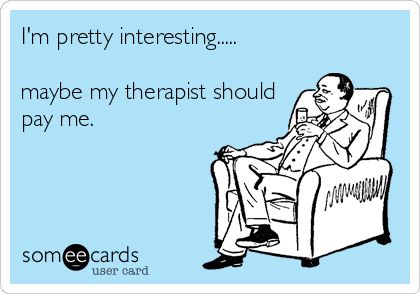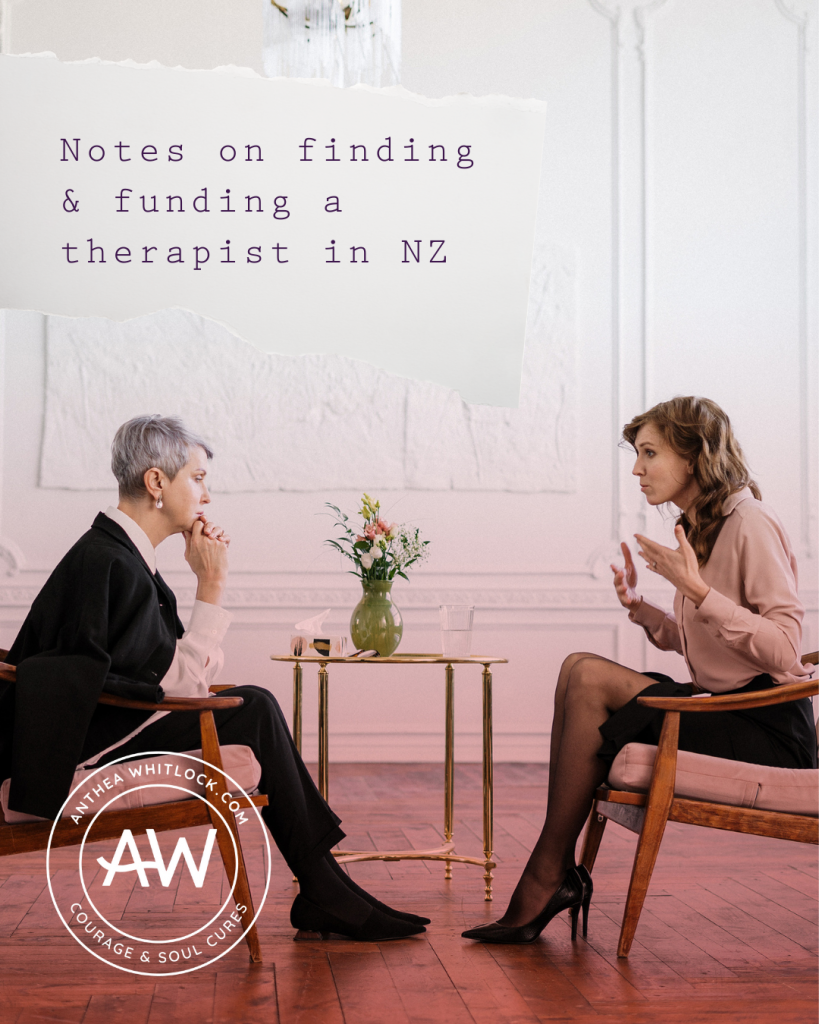Tell me about your childhood... notes from my own experiences of finding, frequenting and getting funding for therapy in New Zealand.
There are all manner of reasons why people go to therapy or counselling. It's definitely not something reserved for only the totally "screwed up" (whatever that means, 'cos we all have our 'stuff'). My main motivation was wanting help with issues I had around self-worth. It had been becoming more & more obvious to me that they were holding me back from what I really wanted out of my life.
Perceived stigma is, sadly I suspect, still a big reason why many people who could benefit hugely from therapy or counselling don't pursue it. I had this block myself, after growing up in a family where mental illness had been ever present but cloaked simultaneously in unspoken shame. This is partly why I'm now loud & proud re therapy - my own experience is that even the high-functioning-but-stuck or under realised can get such a lot from better understanding ourselves. Remembering that, as we create positive change inside of us, we're also transforming our environment and the impact we have on it for the better too.
There is finding that right person for you when you decide that talking to someone might be a good idea. Then perhaps the question of how will you pay for it ...and if you can't afford it, can you get funding for therapy in New Zealand?
The following is some of what I learned along the way in case it is helpful in any way.
Finding therapy - what and who to choose
There are four main types of therapists - counsellors, psychotherapists, psychologists and psychiatrists - and each takes a different approach. I recommend to do your own research to see which one sounds right for you. This article also provides a good summary of the distinctions between them.
Note that while psychotherapists, psychologists and psychiatrists must be legally registered in New Zealand in order to practice as such, counsellors do not. However, a counsellor worth his/her salt will presumably be a member of a relevant professional body, such as the New Zealand Association of Counsellors (NZAC). You can easily confirm online whether they are or not.
Personally, I went with a clinical psychologist (a psychologist also trained specifically in talking therapies). I just felt that if this was something I was going to do, then I wanted someone that I knew was highly trained in matters of both therapy and the mysterious (at least to me) intricacies of the brain.
I also asked around. I was lucky enough to know people who worked within the mental health sector in my local area and I quizzed them, quite bluntly, about who they thought was the best. I then took some effort to track that particular person down. Another approach I could have taken if needed, was to ask any friends who I knew had firsthand experience.
There are different modalities that both psychotherapists and psychologists use. I'm not going to pretend I understand them with any great proficiency, but the model we used was called Intensive Short-Term Dynamic Psychotherapy (ISTDP), which personally I feel (some time on now) has been hugely successful for me 
Of course I didn't know any of this at the start. I simply went along to see how it felt and whether I liked the cut of this therapist's jib, so to speak. If therapy is something you're considering, then this article could also be worth a quick read.
Going to therapy - what to expect
Just like Kiwi icon, Rachel Hunter, professed in THAT advert, it won't happen overnight...

THE STATE OF YOUR HEAD IS UNLIKELY TO CHANGE OVERNIGHT, RACH. GOTTA LOVE A REALIST.
i.e. therapy is a longer-term rather than a quick fix thing. It may involve, after all, literally grooving new neural pathways into your brain to replace those old (potentially no longer very useful) super highway default routes you were previously conditioned with. As a total nerd, I find this whole concept completely fascinating BTW!
In saying this, following each session I felt I went away with new perspectives or ways of approaching things to try on for size. It was all very interesting to self-experiment with.
In my experience, therapy isn't focused on incessantly rehashing the past - because in all honesty who wants to live there. More like, after an initial "lay of the land" to get my therapist up to speed on formative pieces of my background, we worked very much in the present. Harking back to history at times only to recognise how that shaped the way I was dealing with the here & now, and that perhaps wasn't working for me so well.
Perhaps the most empowering thing I gleaned from the entire shebang was the realisation that so much of how we see & feel about ourselves comes directly from deeply ingrained belief systems. Those we neither chose consciously, nor often are even aware we have.
Beliefs that are false ...yet we live so much of our life based upon them.
Beliefs that we can work towards altering IF we are aware of them. Replace your false beliefs, change your life?
I found I couldn't help but think ...if XYZ isn't true, then what is? A whole new world of possibility can soon begin to open up...
Having a therapist is having someone completely on your side, someone rooting for you. Someone who actually listens to understand (how rare is that?!!) Someone with no agenda except to see you be successful at being you. After some initial trepidation, this is how I came to feel.
Funding for therapy in New Zealand - can you get therapy paid for or subsidised?

TOUCHÉ. UNFORTUNATELY THOUGH, NEVER AN OPTION OFFERED TO MOI
If you can't afford to self-fund your own therapy, there are options (not all of which are very well publicised) listed below.
My therapist actually helped me secure funding, so this is definitely a question worth asking them if going with a private practitioner (note that many therapists work in both public and private sectors). Most therapists should be fully versed with the in's & out's & eligibility criteria when it comes to funding for therapy in New Zealand.
Here are various therapy funding options that I know exist:
Much love,
xAnthea
PLEASE NOTE:
I am in no way masquerading as a health professional. Any content published on this website has been inspired largely by my own personal experiences or those of others, and should not be understood or construed as professional or medical health care advice. Neither is this website intended to diagnose, treat, cure or prevent any health condition or disease. In full transparency, while aspects of this site may enable a source of income to help make its continued upkeep possible, the central focus is always encouragement which is lavished freely. Any products & services promoted have been used by me personally and shared only where I believe they may be of interest and benefit to you, dear reader.




